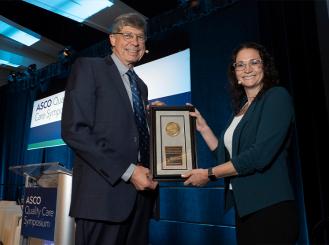Jan 14, 2022
By Vicki Kilpatrick and Kelly Baldwin, ASCO Communications
The 2021 ASCO Quality Care Symposium (QCS), which took place in September, was ASCO’s first hybrid in-person and online meeting; it brought together oncology professionals from around the globe to discuss innovative strategies to improve the quality of care for millions of people living with cancer worldwide. More than 300 abstracts were presented, and the research addressed some of today’s most vital health care priorities, including survivorship, models for Hospital-at-Home programs, barriers to clinical trial access, challenges and advances developed during COVID-19, and disparities and social determinants of health.
Research Highlights
Two studies of note, both federally funded, were highlighted in the meeting’s official Press Program. The first study, “A randomized controlled trial of the effect of a community-based intervention on patient activation, health-related quality of life, and acute care use” (Patel et al. Abstract 1) looked at the effect of an intervention that paired low-income and racial minority patients with trained community health workers. A total of 160 patients with newly diagnosed cancers were randomly assigned to receive 6 months of standard cancer care or an intervention involving community health workers. Patients partnered with community health workers had greater improvements in quality of life, greater patient activation, and lower acute care use compared with patients who received standard care.
“The intervention is an example of how collaborations with communities, employers, and health plans can yield novel approaches to overcome inequities in cancer care delivery,” said lead author Manali I. Patel, MD, MS, MPH.
The second study, “Association between insurance plan, prior authorization, and time to receipt of oral anticancer drugs” (Lichtenstein et al. Abstract 6), examined the relationship of prior authorizations and delays in patient receipt of oral anticancer drugs, which can have consequences for patient care and mortality. The researchers found that the majority—72.3%—of oral anticancer drugs received by patients in the study required prior authorization, which was found to be associated with delayed time to receiving the therapy.
“It is clear from our work that the current process for obtaining oral oncolytics is complex and multifaceted, and that more research is needed,” said lead author Morgan R.L. Lichtenstein, MD.
Program Highlights
QCS Program Committee chair Gabrielle B. Rocque, MD, MSPH, FASCO, led the meeting’s opening session, “The Patient Voice: ‘Metavivors’ and Long-Term Survivorship Care.” The session featured patient representative speakers and focused on topics related to social determinants of health and survivorship with regards to metavivors (patients living with metastatic cancers).
The program included a keynote address on integrating hope and empathy into clinical oncology, delivered by Benjamin W. Corn, MD, who was honored earlier this year with the 2021 ASCO Humanitarian Award.
John V. Cox, DO, FASCO, received the 2021 Joseph V. Simone Achievement Award for Excellence in Quality and Safety in the Care of Patients With Cancer for his many significant and enduring contributions to the quality and safety of cancer care. His award lecture focused on insights gained over his career and challenged the next generation of leaders to advocate for radical change in cancer care delivery.
“The Patient Voice” and the lectures delivered by Dr. Corn and Dr. Cox were some of the most well-received sessions at the meeting, and the recordings of these three sessions are available for public access.
The ASCO Quality Care Symposium is supported in part by Conquer Cancer, the ASCO Foundation.

